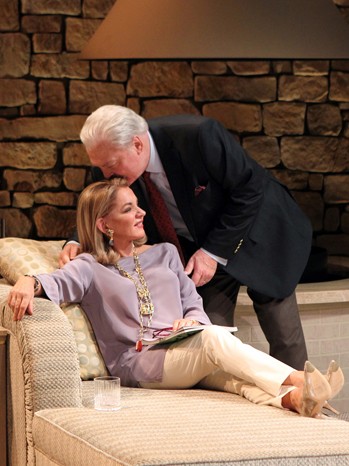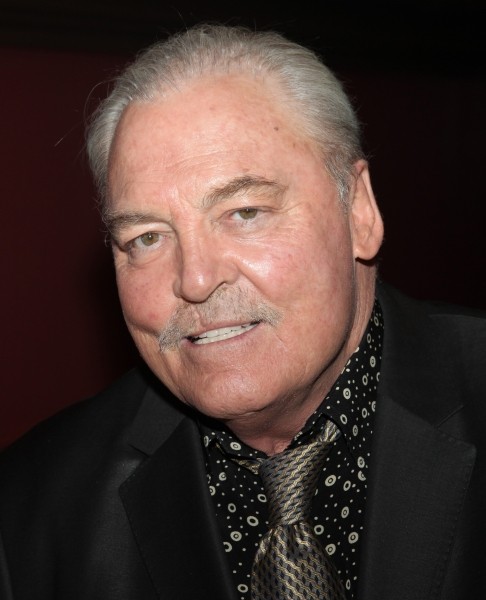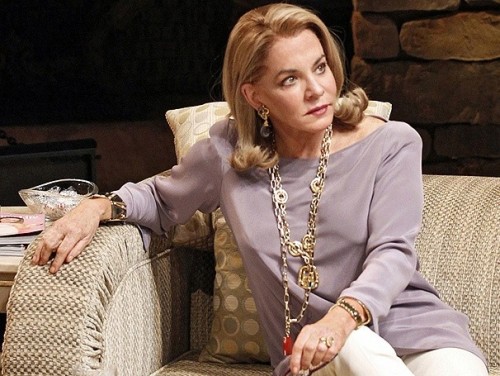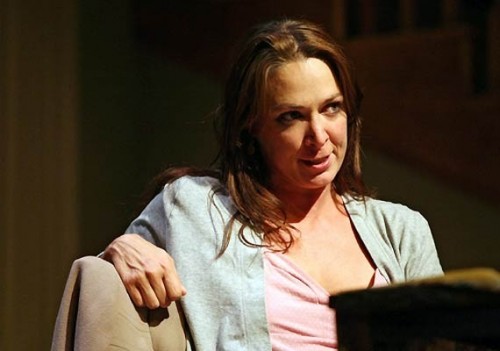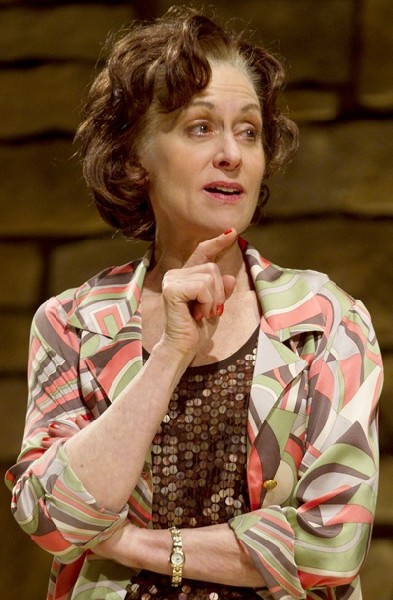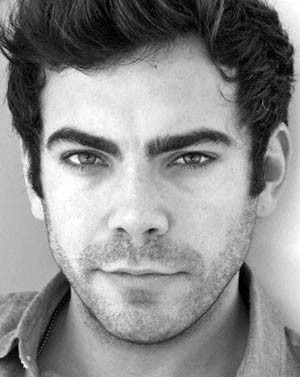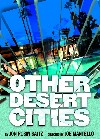Other Desert Cities by Jon Robin Baitz
Reloading for a Tony Run
By: Charles Giuliano - Apr 24, 2012
Other Desert Cities
By Jon Robin Baitz
Directed by Joe Mantello
Sets by John Lee Beatty; costumes by David Zinn; lighting by Kenneth Posner; sound by Jill B C DuBoff; music by Justin Ellington; production stage manager, James FitzSimmons; managing director, Adam Siegel; production manager, Jeff Hamlin. Presented by the Lincoln Center Theater, under the direction of André Bishop and Bernard Gersten, in association with Bob Boyett.
The Booth Theater
222 West 45th Street, Manhattan; (212) 239-6200
Running time: 2 hours 15 minutes.
Cast: Stockard Channing (Polly Wyeth), Elizabeth Marvel (Brooke Wyeth), Stacy Keach (Lyman Wyeth), Judith Light (Silda Grauman) and Matthew Risch (Trip Wyeth).
Driving from Los Angeles to posh Palm Springs along Route 10 the sign for the next exit states Other Desert Cities.
In this arid, upscale setting, with hot days and cold nights, Stacy Keach (Lyman Wyeth) and Stockard Channing (Polly Wyeth) former show biz Republicans, friends and members of the inner circle of Ronald and Nancy Reagan, have opted to live out their golden years.
It's Christmas time in their well appointed home. The set design by John Lee Beatty aptly conflates crass conspicuous wealth and tacky taste. This is symbolized by a curving back wall in rustic, buff stone with upholstered, expensive, but generic furniture set on the non descript, wall-to-wall carpeting that was emblematic of interior decoration and a House Beautiful paradigm of the 1960s.
That period look is also conveyed in the casual, sporty attire of the former second string movie star Lyman (rather like the B movies of his idol the actor President). Similarly, Polly telegraphs that smug, masters of the universe Republican chic with a frozen crown of stiff, perfect blonde hair and designer threads. It implies weekly visits to the beauty parlor and lunches with the ladies at an exclusive golf club.
After successful and prosperous years- she as a Hollywood script writer with her sister Judith Light (Silda Grauman)- and he as an ambassador, they deserve their tranquility in God’s sun splashed waiting room.
Then two kids, now young adults, arrive to celebrate the Holiday.
Oh my.
Initially it’s all hugs, kisses, fresh squeezed orange juice for breakfast, tennis, leisure, evening cocktails, and Christmas dinner at the club.
Most of us recall those holiday rituals. But, even in middle age with successful careers and busy lives, it is just a matter of a day or two until we morph back, devolve, into subservient roles as the children of our parents.
Old battle lines harden regressing to resisting the parental repression that we struggled so hard to escape. To go home again, however briefly, is to suffer an implosion of self esteem, maturity and independence. For their part the parents, having reluctantly let us flee the nest, again get their claws into us.
Within hours of arriving home for the holidays we are planning our escape. Although there is the veneer of joy of being with family and loved ones. Too often a mask we hide behind for the occasion.
Brooke, a struggling novelist, has not been home for six years. There is immediate tension with her parents- particularly her mother- but also the visible pleasure of being with her brother Trip (Matthew Risch). Smart, liberal and over educated he has lowered the bar on all that talent by being involved with a reality TV show.
There is a contrast between his compromised artform, but healthy, grounded pragmatism, and her unwavering, damaging, righteous, self-centered ambition as a serious writer of fiction. For which she has received, at best, moderate success.
This intense drama with well crafted comedic relief after great success Off Broadway transferred to the Booth Theatre in November. Rachel Griffiths, of TVs Six Feet Under and Brothers and Sisters (a project initiated by the playwright Jon Robin Baitz) took over the role originally performed by Elizabeth Marvel.
Linda Lavin turned down a transfer to Broadway as the recovering alcoholic, sharp witted, conniving Silda. The theatre community speculated why she would decline such a strong role. Apparently, she also passed on a chance to appear in Follies on Broadway. This week she earned rave reviews as the lead in The Lavins.
Other Desert Cities was originally planned to close in early January but is now extended through the Spring with Marvel joining the cast (since March 8) along with Risch. The production is scheduled to transfer to Los Angeles in the fall. When we attended on a week night the show played to about two thirds of a house.
The evening was a riveting but disturbing experience. When Polly says, “Families get terrorized by their weakest member” the line shot through like a bolt of lightning. It jolted long repressed feelings of my own family tragedies and disasters. With uncanny parallels between successful conservative parents, radical/ liberal rebellion, and the catastrophe of dysfunctional family members.
Brooke's six year hiatus from homecoming is more than just a lapse. For at least a year Brooke had a mental break down and was confined to an expensive mental hospital. (It seemed like the famed McClean’s Hospital in Belmont, Mass.) Polly had been there bedside when she was all but catatonic.
As the first act evolved there was a gradual reversal and meltdown. At first Polly seems completely in charge as the sharp tongued, witty, connected politician’s wife. In this role Channing is flawlessly brilliant. She constantly name drops “Nancy” as her best friend and role model.
That's Nancy as in Reagan not Pelosi. For me, I don’t know about you, it’s a compellingly hateful reference. As a tax and spend liberal from Massachusetts the Reagans were no friends of mine. Ok, here I go. Ronnie was a second rate actor and worse president. And how could I have a shred of sympathy for the smarmy Wyeths who were his collaborators and friends.
The Wyeths, although Lyman seems like a nice guy, just make my skin crawl. I have complete compassion for their battered kids Brooke and Trip. Baitz paints this Republican family with broad chiaroscuro strokes of good and bad.
It is all the more remarkable to learn that the uber frosty, waspy Polly, before going right wing Hollywood, was Jewish from Texas. No wonder she plans Christmas Eve at the club. It is just a sliver of insight regarding the complete fabrication and deception of her life. Extended uneasily to their children who clearly do not buy into the program.
Polly and Lyman perfectly conflate with Ronnie and Nancy. He is all charm with the easy going glib denial of a second rate movie star. She is the gussied up, sharp tongued, mean and vindictive little woman who wears the pants in the family.
Perhaps Baitz should go one step further and write a play about the Reagan family. How one would love/ hate to see that one.
The unspoken guerrilla in the room is the third child Henry. Polly and Lyman have worked hard to move beyond their son and a life that ended in a horrific radical crime (a Weatherperson-like bombing with victims) and Henry's subsequent suicide.
Brooke can’t let go. The manuscript she has worked on for the past few years is not another artsy novel. She is about to publish a full and factual account of the life and death of Henry. Coming home for the holiday has the real agenda of sharing the text with her family and seeking their approval. An excerpt is about to run in The New Yorker followed by the full publication in a matter of months after that. So there is need for an immediate response.
After that revelation Christmas, with all of its tinsel and cheer, is out the window. Brooke has trashed the manger. The fragile cohesion of forced holiday reunion has shattered the family into a multi-valent, cubist assemblage.
The actors vector off in a cacophony of emotions, motives, agendas, antagonisms and alliances. The pace of psychological intensity, accented by the sharp twists and turns of a brilliant cast, are explicitly conveyed in the insightful script of Baitz.
The characters careen off of each other like pool balls in a cutthroat match between Fast Eddy and Minnesota Fats.
There are obvious alliances. Kids vs. parents. Trip wavers but mostly supports his sister’s rights to tell the story even with its collateral damage. He has his own memories and conflicts about Henry.
Polly and Lyman are understandably aghast that the family laundry will be aired. They will be forced to relive their worst nightmares and failures as parents. Bringing up a horrific past will unravel their fragile efforts to solicit support from Republican friends. How to explain, yet again, that their son was an unpatriotic, radical terrorist?
The Reagans hosted a dinner in Hollywood as a signifier of their support and understanding. The Wyeths managed to distance themselves from the crime of their son and guilt for his suicide. It is not clear how they would fare if all of those events are revealed in Brooke's tell-all book.
Although now out of the game their hard fought tranquility will be shattered. Lyman simply refused to read the devastating manuscript. He will support her right to publish the text while mourning the death of a second child.
The wild card and wonderfully leveraged trump in this family deadlock is the crusty, down on her luck, recovering alcoholic Silda. It seems that she is all too familiar with Brooke’s manuscript. When Polly reads the text she rightly identified Silda’s voice and shrill accusations. The immediate damage is that the dependent sister will be tossed out to fend for herself. Perhaps the next stop is the home for retired Hollywood actors. For old resentments that are not fully revealed it is collateral damage that Silda embraces.
The complex relationship between Silda and Polly is a part of what Baitz unevenly conveys as “The indentured servitude of having a family.” Trip has been warned that a similar task may fall to him in caring for his emotionally unstable sister.
Late in the second act familial tension reaches a shattering emotional apogee. Even the resolutely moderate Lyman has blown his cool and is shouting. Brooke will not back down. Telling the story of Henry is essential to her recovery from mental illness and survival. Lyman begs for time. Can Brooke hold back publication for a few years? Until after her parents are gone.
There is a sharp reversal. The long repressed truth surfaces. No. We won’t reveal the plot twist. It’s a stunner.
In a weak and unnecessary coda Baitz seems intent on sleep that knits up the raveled sleeve of care. It is a misstep as the playwright attempts to tie up the loose ends that might better have been left to our imagination.
Overall Other Desert Cities is a pot boiler that, with less firm direction (Joe Mantello), might easily have careened into melodramatic bathos. It takes a deft hand to keep the frenetic characters from being consumed by their own mordant agendas. There are lots of holes in the credibility of the plot and plausible interactions of the characters.
What makes this play work is its superb cast.
Rightly, critics note that this may be Channing’s finest work. The performance made me find new respect for the depth and understated craft of Keach.
We were totally absorbed by the complex nuances of Marvel, who was exactly that, in the demanding role of Brooke. There was just the right balance between her strength as a committed writer and artist and the vulnerability that led to a mental breakdown. Light was spot on hovering between a shattered, broken artist, now dependent on the kindness of not strangers but family, and a skewering, vengeful conspiracy with Brooke to bring down her self-righteous sister.
Of the performances the least compelling was Risch a Trip. But the fault lies less with the actor than the script of Baitz. Compared to the other high octane characters, each vying to suck oxygen out of the room, Trip has been given the least to work with.
This production will continue through the announcement of Tony nominees. Surely Channing will be in the running. Marvel should be, but since Rachel Griffiths premiered the role on Broadway, she will be passed over. Pity. There are likely to be several Tony nominations that will help to extend the run.
With Spring cleaning, however, there are a lot of hot new shows on Broadway. Catch Other Desert Cities for a great evening of theatre. Or, wait until it hits the road coming to a regional theatre near you. Without that great cast and director, however, caveat emptor. You might see the Baitz play for what it really is; just Another Desert City.

